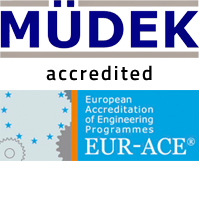The Electrical & Electronics Engineering (EEE) programme provides a strong background in electrical and electronics theory, which is reinforced through practical laboratory work. Emphasis throughout the programme is on understanding the fundamental principles underlying electronics across a wide spectrum of industrial and consumer applications. The programme provides preparation for our graduates to succeed in their chosen field of interest. The ultimate aim of the Department is to raise competent, innovative and creative engineers.
Specializations are offered in key areas, such as industrial electronics, control systems, computer hardware and communication systems. Courses in EEE cover a wide range of topics, such as electrical circuits and systems, electronics, telecommunications, digital system design, and microcomputer system design. The curriculum and the syllabi are prepared with equal emphasis on EEE. Apart from providing students with the necessary theoretical background, emphasis is on practical experience gained through laboratory work and experimentation. Students have access to several up-to-date and well-resourced facilities, such as our Physics Laboratory, General Computer Laboratories, Electronics Laboratory, Digital Electronics and Microprocessor Laboratory, Computer-Aided Design Laboratory and Computer Networks Laboratory.
To acknowledge the worldwide importance of EEE, the department has established high-quality links and collaborations with universities and industries in Turkey and the UK, so as to give practical orientation to the academic studies. Experts in the field are invited regularly to give seminars and lectures to EUL students. Visits to industry are arranged periodically in order to familiarize the students with the practical side of the branch. EUL graduates in EEE are highly sought after in industry with rewarding career opportunities.
The Department of Electrical & Electronics Engineering seeks to bring up students who have a wide knowledge of practical and theoretical information, the skills to solve problems analytically, to be able to learn or acquire knowledge through research and who adopt a lifetime process of learning as their motto.
Once students successfully graduate from the undergraduate programme, they will be able to be inquisitive when solving problems, will have an in-depth knowledge of mathematics, physics and sciences. Ultimately these will be the skills required to determine mistakes analytically and criticise in constructive fashion, and to be able to successfully design or test electrical and electronics equipment.
Education Objectives:
Students who are graduating from Electrical and Electronics Engineering Department are expected:
EO1: to be developing a professional career in a private or government organisation in the field of Electrical and Electronics Engineering.
EO2: to be working on or have completed graduate studies.
EO3: To be participating in several courses, symposiums or certificate programs in an effort to self-improve.
EO4: To be leading or be involved with partnerships in commercial ventures.
EO5: To have assumed responsibility at different levels in various organisations.
Programme Outcomes
The Program Outcomes for the Electrical and Electronics Engineering Department at the European University of Lefke are listed below. Students graduating from the program should have:
i. Adequate knowledge in mathematics, science and engineering subjects pertaining to the Electrical and Electronics Engineering discipline; ability to use theoretical and applied knowledge to solve complex engineering problems.
ii. Ability to identify, formulate, and solve complex engineering problems; ability to select and apply proper analysis and modeling methods for this purpose.
iii. Ability to design a complex system, process, device or product under realistic constraints and conditions, in such a way as to meet the desired result; ability to apply modern design methods for this purpose.
iv. Ability to devise, select, and use modern techniques and tools needed for analyzing and solving complex problems encountered in Electrical and Electronics Engineering practice; ability to employ information technologies effectively.
v. Ability to design and conduct experiments, gather data, analyze and interpret results for investigating complex engineering problems or Electrical and Electronics Engineering specific research questions.
vi. Ability to work efficiently in intra-disciplinary and multi-disciplinary teams; ability to work individually.
vii. Ability to communicate effectively in Turkish, both orally and in writing; knowledge of a minimum of one foreign language; ability to write effective reports and comprehend written reports, prepare design and production reports, make effective presentations, and give and receive clear and intelligible instructions.
viii. Recognition of the need for lifelong learning; ability to access information, to follow developments in science and technology, and to continue to educate him/herself.
ix. Consciousness to behave according to ethical principles and professional and ethical responsibility; knowledge on standards used in engineering practice.
x. Knowledge about business life practices such as project management, risk management, and change management; awareness in entrepreneurship, innovation; knowledge about sustainable development.
xi. Knowledge about the global and social effects of Electrical and Electronics Engineering applications on health, environment, and safety, and contemporary issues of the century reflected into the field of engineering; awareness of the legal consequences of engineering solutions.
Contact Details
Tel: +90 392 660 2000 – 2501
Fax: +90 392 660 2503
Postal Address: European University of Lefke
Lefke, Northern Cyprus TR-10 Mersin, Turkey
E-mail: engineering@eul.edu.tr



